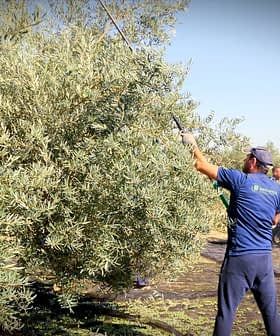Study: Asphalt Made with Olive Pomace More Resilient to Weathering
Adding olive pomace to asphalt binder made the resulting paving material more resistant to cracking and is an environmentally friendly way to recycle the waste product.
The right amount of olive pomace incorporated into asphalt binder could dramatically enhance the resilience of paving materials to cracking and other forms of weathering, a new study found.
The research confirmed the results of previous studies and explored the production process of a new kind of partially sustainable asphalt.
The pomace-modified asphalt mix exhibited better cracking resistance after long-term aging than the control mix.
The study, led by Kun Zhang at the California State University, found that olive pomace could improve the asphalt binder’s resistance to events such as oxidation-induced cracking, fatigue cracking and cracking due to low-temperature events.
In addition, the modified binder also compared favorably to the traditional asphalt binder when it comes to rutting resistance.
Olive pomace is the main byproduct of olive oil production and contains cellulose, hemicelluloses, lignin, uronic acids, phenolic compounds and oily residues.
The massive amount of olive pomace produced by olive oil processing constitutes an environmental challenge due to its potential to pollute and the costs associated with its disposal.
The research, which was funded by the Olive Oil Commission of California (OOCC), showed that olive pomace pulp-rich fraction could be precisely separated from the stone-rich fraction to obtain its optimal level of antioxidant qualities.
By applying this dried olive pomace to the asphalt binder, scientists found that it modified the material with better softening and antioxidant effectiveness, vastly improving its final performance. They also reported that adding up to five percent of the pulp-rich fraction would neutralize the oxidation caused by asphalt mixing and production.
“The use of a higher dosage of pulp-rich fraction – e.g., 15 percent and 25 percent – could significantly extend the service life of modified asphalt binders prior to experiencing initial and severe oxidation-induced cracking,” the researchers wrote. “The pomace-modified asphalt mix exhibited better cracking resistance after long-term aging than the control mix.”
See Also:Healthy Compounds in Pomace Oil Absorbed by Fried Foods, Study FindsThe new research contributed to the OOCC’s ongoing investigations on ways to curtail the potentially polluting effect of waste generated by olive oil processing on soil and groundwater.
In a press release, the OOCC emphasized that “future work on this project will focus on the chemical composition in the processed olive pomace and identify active ingredients that could further extend the life of asphalt pavements.”
According to the study’s authors, the use of the new asphalt binders would promote sustainability in both agriculture and asphalt paving industries.
They also stressed the need “to investigate active ingredients in olive pomace to maximize antioxidant capacity and develop zero-waste recycling methods to utilize wastewater in olive pomace.”
“Study authors are now seeking funds for additional research through the 2021 Agriculture and Food Research Initiative,” the OOCC added, concluding that it has already submitted a letter of support for this project, “to encourage valuable and practical uses for byproducts from olive oil processing.”
- Olive Oil Commission of California
- Olive Oil Commission of California
- Conference on Civil Engineering Architecture & Urban Sustainable Development








